1998 GMC SAVANA key battery
[x] Cancel search: key batteryPage 40 of 388

Let only qualified technicians work on your air bag
system. Improper service can mean that your air
bag system won’t work properly. See
your dealer
for service.
NOTICE:
If you damage the covering for the driver’s or the
right front passenger’s air bag, the bag may not
work properly.
You may have to replace the air
bag module
in the steering wheel or both the air
bag module and the instrument panel for the
right front passenger’s air bag.
Do not open or
break the
air bag coverings.
If your vehicle ever gets into a lot of water -- such as
water up
to the carpeting or higher -- or if water enters
your vehicle and
soaks the carpet, the air bag controller
can be soaked and ruined. If this ever happens, and then
you start your vehicle, the damage could make the air
bags inflate, even if there’s no crash.
You would have to
replace
the air bags as well as the sensors and related
parts.
If your vehicle is ever in a flood, or if it’s exposed
to water that soaks the carpet, you can avoid needless
repair costs by turning
off the vehicle immediately. Don’t
let anyone start the vehicle,
even to tow it, unless
the battery cables are first disconnected.
Servicing Your Air Bag-Equipped Vehicle
Air bags affect how your vehicle should be serviced.
There are parts
of the air bag system in several places
around your vehicle.
You don’t want the system to
inflate while someone
is working on your vehicle. Your
dealer and the
GM Service Manual have information
about servicing your vehicle and the air bag system.
To
purchase a service manual, see “Service and Owner
Publications” in the Index.
For up to 10 minutes after the ignition key is
turned off and the battery is disconnected, an air
bag can still inflate during improper service.
You
can be injured if you are close to an air bag when
it inflates. Avoid wires wrapped with yellow tape
or yellow connectors. They are probably part of
the air bag system. Be sure to follow proper
service procedures, and make sure the person
performing work for you is qualified to
do so.
The air bag system does not need regular maintenance.
1-32
ProCarManuals.com
Page 79 of 388
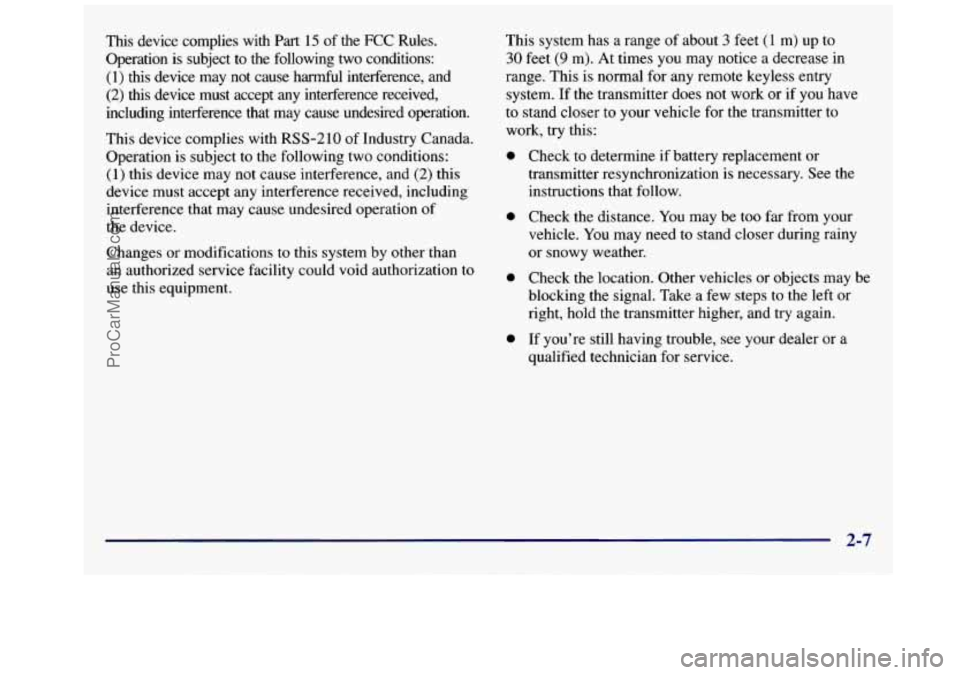
This device complies with Part 15 of the FCC Rules.
Operation is subject to the following two conditions:
(1) this device may not cause harmful interference, and
(2) this device must accept any interference received,
including interference that may cause undesired operation.
This device complies with
RSS-210 of Industry Canada.
Operation
is subject to the following two conditions:
(1) this device may not cause interference, and (2) this
device must accept any interference received, including
interference that may cause undesired operation
of
the device.
Changes or modifications to this system
by other than
an authorized service facility could void authorization to
use this equipment. This
system has a range of about
3 feet (1 m) up to
30 feet (9 m). At times you may notice a decrease in
range. This is normal for any remote keyless entry
system. If the transmitter does not work or
if you have
to stand closer to your vehicle for the transmitter to
work, try this:
0
0
0
0
Check to determine if battery replacement or
transmitter resynchronization is necessary. See the
instructions that follow.
Check the distance.
You may be too far from your
vehicle. You may need to stand closer during rainy
or snowy weather.
Check the location. Other vehicles or objects may be
blocking the signal. Take a few steps to the left or
right, hold the transmitter higher, and try again.
If you’re still having trouble, see your dealer or a
qualified technician for service.
2-7
ProCarManuals.com
Page 80 of 388
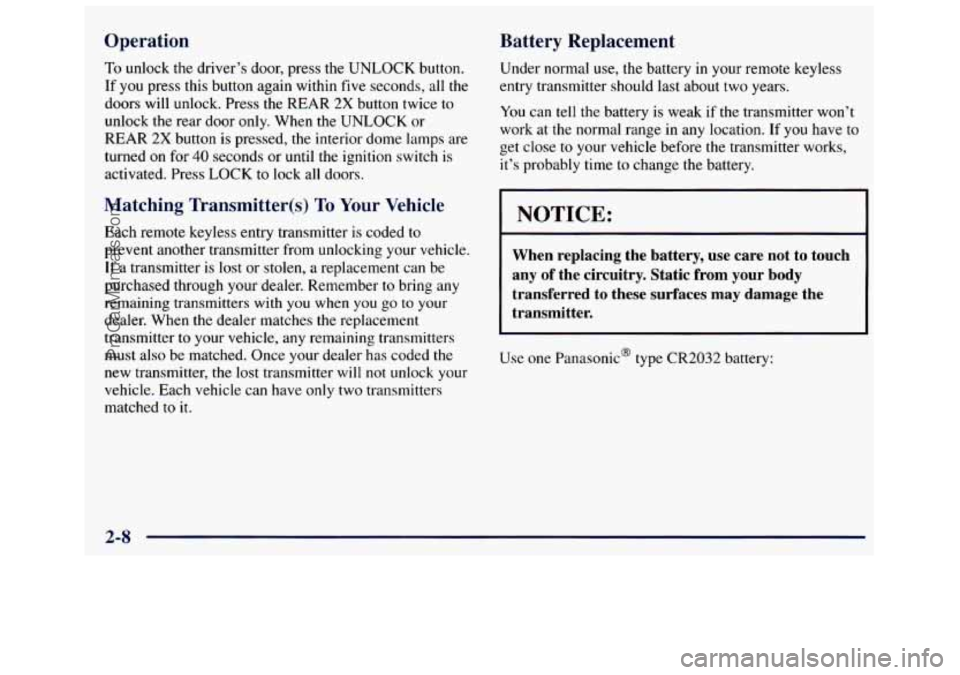
Operation
To unlock the driver’s door, press the UNLOCK button.
If you press this button again within five seconds, all
the
doors will unlock. Press the REAR 2X button twice to
unlock the rear door only. When
the UNLOCK or
REAR 2X button is pressed, the interior dome lamps are
turned
on for 40 seconds or until the ignition switch is
activated. Press LOCK
to lock all doors.
Matching Transmitter(s) To Your Vehicle
Each remote keyless entry transmitter is coded to
prevent another transmitter from unlocking your
vehicle.
If a transmitter is lost or stolen, a replacement can be
purchased through your dealer. Remember to bring any
remaining transmitters with
you when you go to your
dealer. When the dealer matches the replacement
transmitter to your vehicle, any remaining transmitters
must also be matched. Once your dealer
has coded the
new transmitter,
the lost transmitter will not unlock your
vehicle. Each vehicle can have only two transmitters
matched to
it.
Battery Replacement
Under normal use, the battery in your remote keyless
entry transmitter should last about two years.
You can tell the battery is weak if the transmitter won’t
work at the normal range in any location.
If you have to
get close to your vehicle before the transmitter works,
it’s probably time
to change the battery.
NOTICE:
When replacing the battery, use care not to touch
any
of the circuitry. Static from your body
transferred to these surfaces may damage the
transmitter.
Use one Pmasonic@ type CR2032 battery:
2-8
ProCarManuals.com
Page 81 of 388
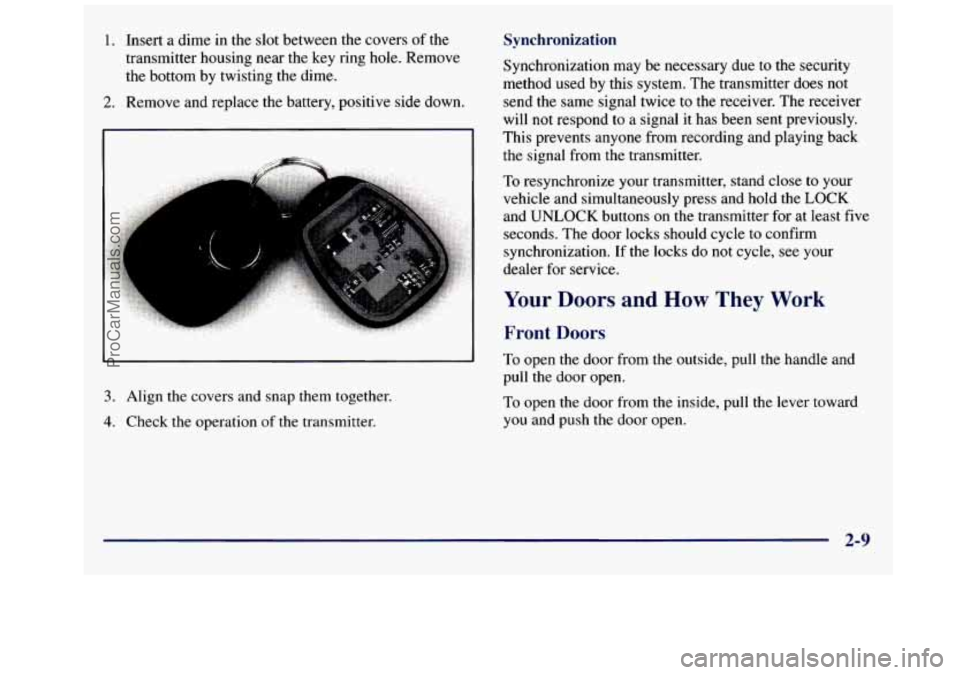
1. Insert a dime in the slot between the covers of the
transmitter housing near the key ring hole. Remove
the bottom by twisting the dime.
2. Remove and replace the battery, positive side down.
3. Align the covers and snap them together.
4. Check the operation of the transmitter.
Synchronization
Synchronization may be necessary due to the security
method used by this system. The transmitter does not
send the same signal twice to the receiver. The receiver
will not respond to a signal it has been sent previously.
This prevents anyone from recording and playing back
the signal from the transmitter.
To resynchronize your transmitter, stand close to your
vehicle and simultaneously press and hold the
LOCK
and UNLOCK buttons on the transmitter for at least five
seconds. The door locks should cycle to confirm
synchronization. If the locks do not cycle, see your
dealer for service.
Your Doors and How They Work
Front Doors
To open the door from the outside, pull the handle and
pull the door open.
To open the door from the inside, pull the lever toward
you and push the door open.
2-9
ProCarManuals.com
Page 91 of 388
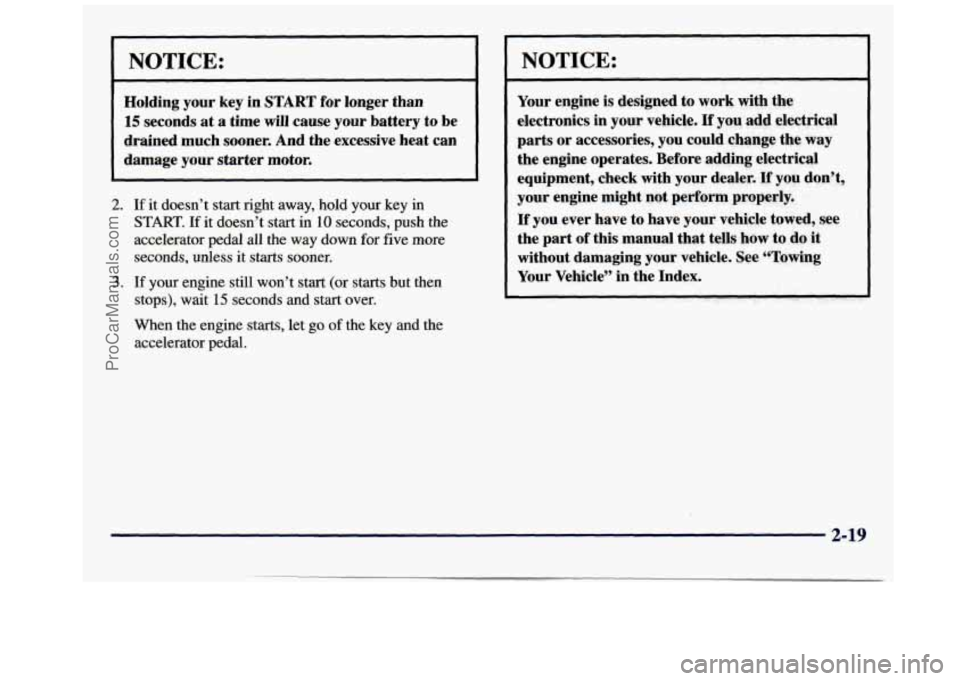
NOTICE:
Holding your key in START for longer than
15 seconds at a time will cause your battery to be
drained much sooner. And the excessive heat can
damage your starter motor.
2.
3.
If it doesn’t start right away, hold your key in
START. If it doesn’t start in 10 seconds, push the
accelerator pedal all the way down for five
more
seconds, unless it starts sooner.
If your engine still won’t start (or starts but then
stops), wait
15 seconds and start over.
When the engine starts, let go
of the key and the
accelerator pedal.
NOTICE:
Your engine is designed to work with the
electronics in your vehicle.
If you add electrical
parts or accessories, you could change the way
the engine operates. Before adding electrical
equipment, check with your dealer.
If you don’t,
your engine might not perform properly.
If you ever have to have your vehicle towed, see
the part
of this manual that tells how to do it
without damaging your vehicle. See “Towing
Your Vehicle” in the Index.
.,
ProCarManuals.com
Page 93 of 388
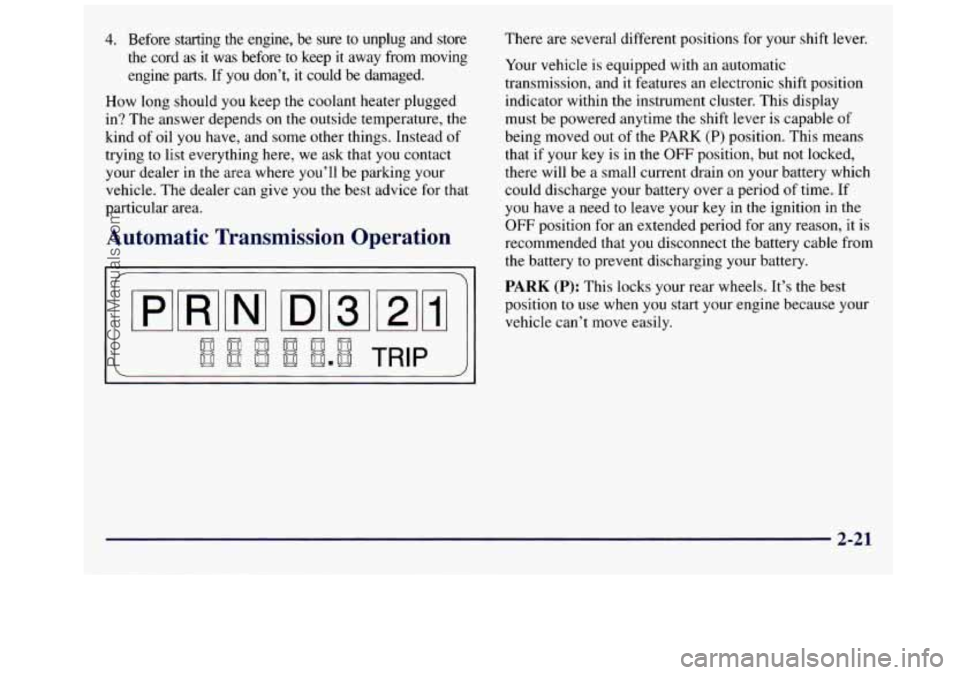
4. Before starting the engine, be sure to unplug and store
the cord
as it was before to keep it away from moving
engine parts.
If you don’t, it could be damaged.
How long should you keep the coolant heater plugged
in? The answer depends on
the outside temperature, the
kind of oil you have, and some other things. Instead
of
trying to list everything here, we ask that you contact
your dealer in the area where you’ll be parking your
vehicle. The dealer can give you the best advice for that
particular area.
Automatic Transmission Operation
There are several different positions for your shift lever.
Your vehicle is equipped with
an automatic
transmission, and it features an electronic shift position
indicator within the instrument cluster. This display
must be powered anytime the shift lever is capable of
being moved out of the
PARK (P) position. This means
that if your key is in the
OFF position, but not locked,
there will be a small current drain on your battery which
could discharge your battery over a period of time. If
you have a need to leave your key in the ignition in the
OFF position for an extended period for any reason, it is
recommended that
you disconnect the battery cable from
the battery to prevent discharging your battery.
PARK (P): This locks your rear wheels. It’s the best
position
to use when you start your engine because your
vehicle can’t move easily.
2-21
ProCarManuals.com
Page 126 of 388

Air Bag Readiness Light
There is an air bag readiness light on the instrument
panel, which shows AIR
BAG. The system checks the
air bag’s electrical system for malfunctions. The light
tells you if there
is an electrical problem. The system
check includes the air bag sensor, the air bag modules,
the wiring and the crash sensing and diagnostic module.
For more information
on the air bag system, see “Air
Bag” in the Index.
AIR
This light will come on
when you start your engine,
and it will flash for a few
seconds. Then the light should go
out. This means
the system
is ready.
If the air bag readiness light stays on after you start the
engine or comes on when you are driving, your air bag
system may not work properly. Have your vehicle
serviced right away. The
air bag readiness light should flash for a few
seconds when
you turn the ignition key to RUN. If the
light doesn’t come
on then, have it fixed so it will be
ready
to warn you if there is a problem.
Charging System Light
(CJ
This light should come on
briefly when you turn on the
ignition, before starting the
engine, as a check to show
you it is working.
After the engine starts, the light should
go out. If it stays
on or comes on while you are driving, you may have a
problem with your charging system. It could indicate a
problem with the alternator drive belt, or some other
charging system problem. Have
it checked right away.
Driving while this light is on could drain your battery.
If you must drive a short distance with this light
on, it
helps
to turn off all your accessories, such as the radio
and air conditioner.
2-54
ProCarManuals.com
Page 304 of 388
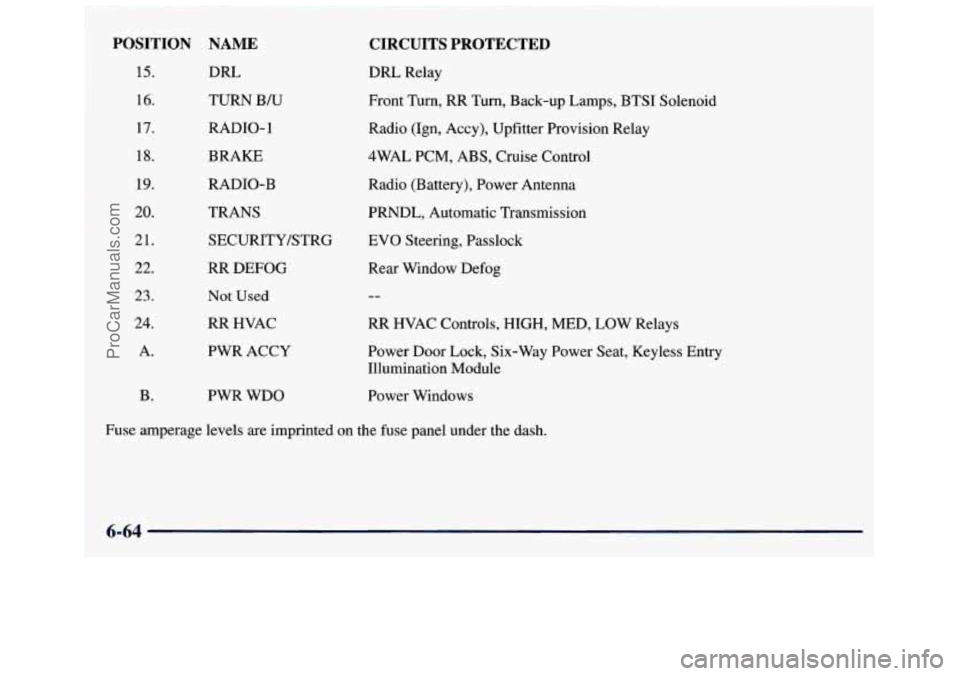
POSITION
15.
16.
17.
18.
19.
20.
21.
22.
23.
24.
A. B.
NAME
DRL TURN
B/U
RADIO- 1
BRAKE
RADIO-B
TRANS SECURITY/STRG
RR DEFOG
Not Used
RR HVAC
PWR ACCY
CIRCUITS PROTECTED
DRL Relay
Front Turn,
RR Turn, Back-up Lamps, BTSI Solenoid
Radio (Ign, Accy), Upfitter Provision Relay
4WAL PCM, ABS, Cruise Control
Radio (Battery), Power Antenna
PRNDL, Automatic Transmission
EVO Steering, Passlock
Rear Window Defog
--
RR HVAC Controls, HIGH, MED, LOW Relays
Power Door Lock, Six-Way Power Seat, Keyless Entry
Illumination Module
PWR WDO Power Windows
~ Fuse amperage levels are imprinted on the fuse panel under the dash.
' 6-64
ProCarManuals.com